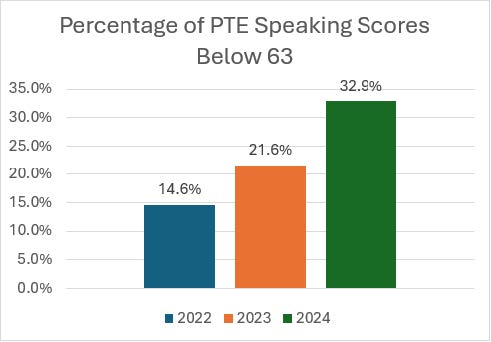Please select the appropriate button below to go the portal login based on your service need.
CGFNS International Scientific Convening Interim Report
English Language Proficiency (ELP) Standards for Healthcare Workers Seeking an Employment-based Visa to Join the U.S. Health Workforce
Since 2022, CGFNS International has advocated for English Language Proficiency standards that are concorded and set at a sufficient level to protect patient safety and to ensure health professionals are safeguarded. CGFNS has steadfastly urged the Health Resources and Services Administration (HRSA) to require approved test providers to adhere to industry standards and to conduct the necessary scientific studies to provide empirical evidence that they meet the language and purpose of Section 343.
In the absence of empirical data on ELP performance required of healthcare workers entering the United States, CGFNS has engaged in a consultation process with Pearson PTE Academic. Based on its scientific review and evidence of other standard-setting and concordance studies, PTE has formally supported HRSA’s raising its speaking score from 50 to 63. Although HRSA has agreed in principle to this change, it has not yet implemented it on either an interim or permanent basis for healthcare workers seeking employment-based visas.
Decision by CGFNS to Raise PTE English Speaking Score
After additional attempts to seek guidance and resolution from HRSA, and after seeing an influx of applicants taking the PTE and entering the U.S. with a speaking score below 63, CGFNS took another look at our own data on ELP for 2024. The data show a significant increase in applicants taking the PTE to satisfy the ELP requirement, from 7% in 2022 to 44% in 2023 to 50% of all applicants in 2024. The other top choice was IELTS at 35%, down from 84% in 2022 and 39% in 2023. Of those VisaScreen® certificate holders who took the PTE in 2024, 33% had a speaking score below 63.

The percentage of healthcare workers entering the U.S. with a PTE speaking score below 63 shows an alarming increase in healthcare workers holding a lower speaking score over the past three years. These healthcare workers were able to meet a lower ELP speaking standard made available to them through the current ELP requirements.
In September 2024, with a concern for patient safety and with the hope of encouraging HRSA to expeditiously change the ELP requirement standards, along with Pearson’s support, CGFNS decided to raise the PTE speaking score from 50 to 63 for our VisaScreen® service. CGFNS hoped that other organizations issuing Section 343 health worker certificates would follow our lead. In December 2024, CGFNS, the founding assessment organization named in Section 343, became the only approved organization requiring a speaking score of 63 for the PTE.
Because healthcare workers have continued to receive certificates from other issuers that have declined to take this interim remedial step, our unilateral decision to raise the PTE speaking score has not stopped healthcare workers with lower English-speaking abilities from entering the U.S. for employment. Indeed, this scenario was highlighted two years previously by nine members of the U.S. House of Representatives, who noted the importance of ELP test scores meeting equivalent standards, and that apparent inconsistencies mean “healthcare workers who are accepted will have demonstrated less skill in spoken communication, a critical component in the delivery of care in clinical settings.” Download a copy of their letter.
CGFNS Convening of ELP Test Providers
Despite inaction on standardizing ELP cut scores, CGFNS is now heartened to see that HRSA has elevated its attention to ELP issues to rectify this problem. HRSA has asked for comments through the Federal Register and is awaiting a report from CGFNS on the outcomes of an ELP convening we organized for experts from all test providers engaged in the validation of English language proficiency of healthcare workers educated outside the United States.
A historic first, the convening sought to develop a consensus across all providers on a set of recommendations to HRSA on specific ELP scores from the respective tests based on scientific studies on concordance, thereby establishing the comparability of English language proficiency required for the safe delivery of patient care in the U.S., regardless of the test chosen by the health worker.
During the session, the assembled experts presented their methodological approaches to scientific studies on standard-setting and concordance findings in comparable migration contexts. They also discussed ancillary issues, including remote proctoring, ELP exemptions, clubbing of scores across test administrations, and setting the required scores for specific health professions. Despite the nuances associated with divergent perspectives on assessment, fulfilling the mandate of patient safety trumped all other concerns and enabled the best minds in the ELP testing industry to agree on their shared responsibility to protect the public.
The two-part action item emerging from this convening puts the ELP testing community in the best position to discharge its responsibility to protect patient safety. First, all in attendance agreed to recommending a set of ELP interim scores to HRSA, drawing from the research previously completed. Second, all agreed that a standard-setting study focusing on the U.S. healthcare context, with due attention to score concordance involving all test providers, is necessary for determining the requisite ELP scores for protecting patient safety in the U.S.
Given the time and resources needed to conduct a comprehensive standard-setting and concordance study for healthcare workers migrating to the U.S. for employment, the expert panel agreed that a viable solution focusing on patient safety concerns would be to recommend to HRSA that it approve and adopt a set of concorded scores across the test providers on an interim basis to allow time for a comprehensive study to be completed.
CGFNS is preparing a report on the outcomes from the convening and plans to submit it to HRSA by the end of February.
Decision by CGFNS to Revert to Existing HRSA’s ELP Standards
With the consensus achieved during the convening, along with HRSA’s willingness to consider the report from CGFNS that is based on the recommendations of this expert panel, CGFNS is confident that the discrepancies in ELP requirement standards will be resolved expeditiously, and that patient safety can be safeguarded uniformly regardless of the test chosen by individual healthcare workers. CGFNS will continue to work with the test providers to advise HRSA on the requisite ELP standards for protecting patient safety, while remaining committed to asserting its leadership in measurement science to inform other organizations engaged in this process.
While we await the outcome of this process, CGFNS has reverted to the existing HRSA standard of a PTE speaking score of 50 and to observe the current HRSA standard on all ELP scores across test providers. We hope that the newly developed consensus among all ELP test providers will soon lead to favorable action on ELP standards to protect patient safety and to safeguard healthcare professionals coming into the U.S. to work.
Background: U.S. Immigration Law, Section 343
Section 343 of the Illegal Immigration Reform and Immigrant Responsibility Act of 1996 (IIRIRA), enacted to ensure patient safety, requires certain healthcare workers to complete a screening process before entering the United States for employment. This process, widely known as the visa screen, requires healthcare workers to obtain a certificate from an approved organization to demonstrate that they have met the same standards of education as American healthcare workers, as evidenced in a comparability of education assessment, licensure clearance, and English language proficiency (ELP) determination.
Since the enactment of Section 343 three decades ago, CGFNS International, the only credential assessment organization with statutory authority over all nine health professions1 requiring a visa screen, has upheld the highest professional standards and applied the requisite rigor in discharging its duties. For ELP determinations, CGFNS has relied upon test providers approved by the Health Resources and Services Administration (HRSA) to ensure that individual healthcare workers meet patient safety standards. CGFNS has consistently advocated for similar vigilance by ELP test providers.
The original English language tests included in Section 343 were TOEFL, TOEIC, and IELTS. Since then, other English proficiency tests, MET, OET, Cambridge English (B2 First, C1 Advanced, or C2 Proficiency Exams), and Pearson PTE Academic, have been approved by HRSA, but they did not become a part of the regulations. Nor did HRSA insist on a scientific process to perform standard-setting and concordance studies to determine the comparability of ELP scores across all tests.
1 The nine professions for which CGFNS was approved for VisaScreen® are Registered Nurses, Licensed Practical or Vocational Nurses, Physical Therapists, Occupational Therapists, Physician Assistants, Audiologists, Speech Language Pathologists, Clinical Laboratory Technicians/Medical Laboratory Technicians, and Clinical Laboratory Scientists/Medical Laboratory Technologists.







